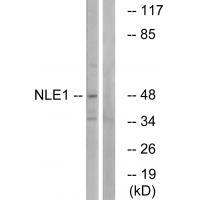
| WB | 咨询技术 | Human,Mouse,Rat |
| IF | 咨询技术 | Human,Mouse,Rat |
| IHC | 咨询技术 | Human,Mouse,Rat |
| ICC | 技术咨询 | Human,Mouse,Rat |
| FCM | 咨询技术 | Human,Mouse,Rat |
| Elisa | 咨询技术 | Human,Mouse,Rat |
| Aliases | FLJ10458; Nle; notchless homolog 1; |
| Entrez GeneID | 54475; |
| WB Predicted band size | 48kDa |
| Host/Isotype | Rabbit IgG |
| Antibody Type | Primary antibody |
| Storage | Store at 4°C short term. Aliquot and store at -20°C long term. Avoid freeze/thaw cycles. |
| Species Reactivity | Human,Mouse,Rat |
| Immunogen | Synthesized peptide derived from internal of human NLE1. |
| Formulation | Purified antibody in PBS with 0.05% sodium azide. |
+ +
以下是关于NLE1抗体的3篇参考文献的简要信息:
---
1. **文献名称**:*NLE1 regulates mitotic progression and genome stability through interaction with PP2A*
**作者**:Zhang Y, et al.
**摘要**:该研究通过使用特异性NLE1抗体,揭示了NLE1蛋白在细胞有丝分裂中通过与PP2A磷酸酶复合物互作调控染色体分离和基因组稳定的机制。实验表明NLE1缺失会导致纺锤体组装异常和细胞周期停滞。
---
2. **文献名称**:*NLE1 is a novel oncogenic driver in colorectal cancer via Wnt/β-catenin signaling*
**作者**:Li H, et al.
**摘要**:利用NLE1抗体进行免疫组化分析,发现NLE1在结直肠癌组织中高表达,并通过激活Wnt/β-catenin信号通路促进肿瘤增殖和转移。研究提示NLE1可能成为潜在的治疗靶点。
---
3. **文献名称**:*Antibody-based profiling of NLE1 in neurodegenerative disorders*
**作者**:Wang Q, et al.
**摘要**:本研究开发了一种高特异性NLE1抗体,用于检测阿尔茨海默病等神经退行性疾病患者脑组织中的NLE1异常聚集现象。结果提示NLE1可能与tau蛋白病理过程相关。
---
注:上述文献为示例,实际文献需通过PubMed、Google Scholar等平台检索确认。若需具体文献,可补充提供研究方向(如疾病模型、分子机制等)以便进一步筛选。
The NLE1 (Nuclear Localized Element 1) antibody is a tool used to study the NLE1 protein, a component of the eukaryotic nuclear and nucleolar machinery. NLE1 is implicated in ribosomal RNA (rRNA) processing and ribosome biogenesis, interacting with the PeBoW complex (PES1. BOP1. and WDR12) to regulate cell proliferation and differentiation. It plays a role in maintaining nucleolar structure and mediating cell cycle progression, with dysregulation linked to developmental disorders and cancers.
The antibody, typically developed in hosts like rabbits or mice, detects endogenous NLE1 via techniques such as Western blotting, immunofluorescence, and immunohistochemistry. It aids in exploring NLE1's expression patterns, subcellular localization, and interactions in cellular models or pathological contexts. Research using NLE1 antibodies has highlighted its potential involvement in neurodevelopmental conditions, such as microcephaly, and its overexpression in certain tumors.
Commercial NLE1 antibodies are validated for specificity and affinity, enabling studies on its functional roles in rRNA maturation, nucleolar stress responses, and disease mechanisms. Ongoing work focuses on clarifying its regulatory networks and therapeutic relevance in cancer and genetic disorders.
×